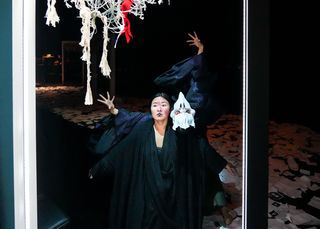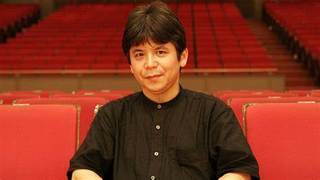|
Back
E.A. Poe Illuminated Philadelphia
Miller Theater
09/21/2022 - & September 24, 29, October 1, 2022
Toshio Hosokawa: The Raven
Kristen Choi (Mezzo-soprano), Muyu Ruba (Dancer, Lenore), Joseph Ahmed, Ang(ela) Bey, Vitche‑Boul Ra, Makoto Hirano, Daniel Park, Minou Pourshariati, Pax Ressler (Lenore((s)))
Eiki Isomura (Conductor)
Aria Umezawa (Director), Joseph Ahmed, Cat Ramirez (Associate Directors), Jennifer Hiyama (Scenic & Props Design) Bless Rudisill (Lighting Designer), Ariel Wang (Costume, Hair and Make‑up Design), Lucas Campbell (Sound Designer), Obvious Agency (Co-creator and Co-Producer)

M. Ruba, K. Choi (© Steven Pisano)
“Deep into that darkness peering, long I stood there wondering, fearing,/Doubting, dreaming dreams no mortals ever dared to dream before;/But the silence was unbroken, and the stillness gave no token/,
And the only word there spoken was the whispered word, ‘Lenore?’/This I whispered, and an echo murmured back the word, ‘Lenore!’—
Merely this, and nothing more.”
From The Raven
“From childhood’s hour I have not been. As others were, I have not seen. As others saw, I could not awaken. My heart to joy at the same tone. And all I loved, I loved alone.”
Edgar Allan Poe
Outside of Fyodor Dostoyevski, Edgar Allan Poe was the most important 19th Century writer who transformed the mysteries of a tortured life with writing itself. Granted, both writers were professionals, both penned essays, ruminations and–and even detective tales. But both writers existed in exotic cosmos far from the reasonable lives of their colleagues.
So in Poe’s case, I have no hesitation in say that he would have revered the monodrama cum ballet cum recitation of The Raven, “monodrama for mezzo-soprano and twelve players,” presented as the opening of the Philadelphia O22 Opera Festival. No, Poe never pictured the Orient, not even the prevalent Chinoiserie of his time. Yet no setting, no words, no styles would have escaped his blessings. Certainly not the second half of this production.
Yes, Poe would have been dismayed by the first non‑ operatic part of the evening. And that makes two of us. This first half, in fact, no matter how well described in the program notes, was preposterous.
Briefly, we the audience sat in different sections of the massive Miller Theater, then different solitary “Lenores” (the mystery woman of two Poe poems) would come to our section and lead us to stand for a solitary...er...lesson? happening? teaching?
Not so much Zen or Mystery Drama as monotonous tedium. I was sitting on the top balcony, and one of the half‑dozen Lenores (he, clad in an Indian-style skirt and a red string) commanded us all to walk to a wall, upon which was pinned a verse from Poe’s Lenore. He then lectured us about trochees, alliteration, rhyme and structures, before handing out bells, triangles and clappers. Then he tore up the poem and led us–finally–down the steps to the stage, where the whole audience sat around a few decorated door lintels, and piles of torn up papers.
And watched the various Lenores walk and stroll and partly dance through the lintels. (Being undistracted by these perambulations, I heterodoxical pictured Polonious declaring, “Neither a borrower nor a lintel be.”)
And then, finally, the monodrama started. And so did the enchantment which E.A. Poe would have enjoyed. For while the Lenores were dressed in white, a Shaman dressed in black, obviously out of a Japanese Noh drama, started the monodrama.

T. Hosokawa
Composer Toshio Hosokawa is reputed as one of Japan’s most innovative, returning from Germany to his homeland. In The Raven, he had written a work which merged Noh drama with Schoenberg’s Erwartung. Thirty‑odd minutes while mezzo Krisen Choi chanted, sung, whispered, shouted–all with the lines of Raven and Leonore. So intense was this, against the partly Japanese style breathing punctuated music (a 12‑voiced orchestra) that one soon was transported to the kind of drama predicted by Antonin Artaud a century ago.
Artaud was intrigued by words (in drama or Balinese opera) which were archaic. In The Raven, Hosokawa took the most familiar words (“Quoth the raven ‘Nevermore’”) and the words lost all literal meaning. They became sounds: scary grotesque, words hollowed into pure emotions.
The wondrous Ms. Choi was joined by dancer Muyu Ruba, face covered by a mask part Noh, part wolverine. Was she the raven? Lenore? Was she the Nemesis, fate?
None and all of these things. As with Artaud, with Balinese dance, with ancient Japanese theater, one was entranced–-no, not entranced but literally bewitched–by the vocalizations, the transmutation, the movement. Poe’s words were a background, yet here the chimeric words became stabbing anxieties.
Until penning these words, I had thankfully forgotten that insipid first half. The second half, with its whispers, cries. and even arias, with the orchestral emphases and the dancing of the wolverine-beast, was a whole image, a startling image.
Poe never explained either his raven or his Lenore. Nor were they explained here. But Mr. Hososkawa gave, if not body or definition , than psychic soul to these words.
And, more than incidentally, incandescent theater.
Harry Rolnick
|